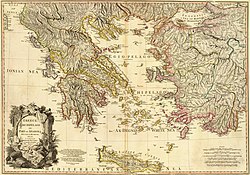Achaeans (tribe)
| History of Greece |
|---|
 |
|
|
The Achaeans (/əˈkiːənz/; Template:Lang-el, Akhaioi) were one of the four major tribes into which the people of Classical Greece divided themselves (along with the Aeolians, Ionians and Dorians). According to the foundation myth formalized by Hesiod, their name comes from Achaeus, the mythical founder of the Achaean tribe, who was supposedly one of the sons of Xuthus, and brother of Ion, the founder of the Ionian tribe. Xuthus was in turn the son of Hellen, the mythical patriarch of the Greek (Hellenic) nation.[1]
Historically, the members of the Achaean tribe inhabited the region of Achaea in the northern Peloponnese. The Achaeans played an active role in the Greek colonization of southern Italy, founding the city of Kroton (Κρότων) in 710 BC. The city was to gain fame later as the place where the Pythagorean School was founded.[2] Unlike the other major tribes (Ionians, Dorians and Aeolians), the Achaeans did not have a separate dialect in the Classical period, instead using a form of Doric.
Etymology
According to Margalit Finkelberg[3] the name Ἀχαιοί/Ἀχαιϝοί is possibly derived, via an intermediate form *Ἀχαϝyοί, from a hypothetical older Greek[4] form reflected in the Hittite form Aḫḫiyawā; the latter is attested in the Hittite archives, e.g. in the Tawagalawa letter. However, Robert S. P. Beekes doubted its validity and suggested a Pre-Greek *Akaywa-.[5]
Origins
The origin of the Achaeans is somewhat problematic. Homer, probably writing in the 9th century BC, uses the term Achaeans as a generic term for Greeks throughout the Iliad,[6] which is believed to describe events in Mycenaean Greece, i.e. before 1150 BC. However, there is no firm evidence that the Greeks of the Mycenaean period used that name to describe themselves. The term Ahhiyawa, found in 13th century BC Hittite texts may mean "Achaeans", that is to say the Greeks of the Mycenaean culture, but again, there is no definitive evidence that this is the case. Emil Forrer went as far to claim that there existed a "great empire" called Ahhiyawa, which stood as equal by the side of the old states of the east. However, his conclusions were disproven by later researchers, especially by Ferdinand Sommer.[7]
In the classical period, the generic term for Greeks was Hellenes, echoing the Hesiodic foundation story in which Hellen was the founder of the Greek race. However, in the Iliad, Hellenes is restricted to those inhabitants of Hellas, a region in Thessaly.[8] There were therefore at least two different traditions concerning the origins of the Greeks, and for this reason, a direct connection between the historic Achaeans and Mycenaean-era Greeks is difficult to establish on the basis of name alone. For instance, the historic Lacedaemonians used that name, but claimed no connection to the Lacedaemonians mentioned in the Iliad; the use of the same name does not therefore automatically imply direct descent.
Both Herodotus and Pausanias recount the legend that the Achaeans (referring to the tribe of the Classical period) originally dwelt in Argolis and Laconia. As Strabo noted however, this is not what Homer meant by the term Achaean.[9] Supposedly, the Achaeans were forced out of those lands by the Dorians, during the legendary Dorian invasion of the Peloponnese.[10] As a consequence, the Achaeans went to the region known as Aegialus and forced the Aegialians (by now known as the Ionians) out of their land.[11] The Ionians took temporary refuge in Athens, and Aegialus became known as Achaea.[12][13]
Pausanias says that 'Achaean' was the name of those Greeks originally inhabiting the Argolis and Laconia, because they were descended from the sons of the mythical Achaeus, Archander and Architeles.[14] According to Pausanias, Achaeus originally dwelt in Attica, where his father had settled after being expelled from Thessaly. Achaeus later returned to Thessaly to reclaim the land, and it was from there that Archander and Architeles travelled to the Peloponnesus.[15] It was supposedly for this reason that there was also an ancient part of Thessaly known as Phthiotic Achaea.
References
- ^ Apollodorus, Library I, 7.3.
- ^ Peoples, Nations and Cultures. Editor John Mackenzie. Weidenfeld & Nicolson. 2005.
- ^ Margalit Finkelberg, "From Ahhiyawa to Ἀχαιοί", Glotta 66 (1988): 127–134.
- ^ According to Finkelberg, this derivation does not necessitate an ultimate Greek and Indoeuropean origin of the word: "Obviously, this deduction cannot supply conclusive proof that Ahhiyawa presents a Greek word, the more so as neither the etymology of this word nor its cognates are known to us".
- ^ R. S. P. Beekes, Etymological Dictionary of Greek, Brill, 2009, p. 181.
- ^ Homer, Iliad II, 574–575.
- ^ Hermann Bengtson: Griechische Geschichte. C.H.Beck, München, 2002. 9th Edition. ISBN 340602503X. pp. 8–15.
- ^ Homer, Iliad II, 683–684.
- ^ Strabo, VIII, 6.
- ^ Herodotus VIII, 73.
- ^ Herodotus VII, 94.
- ^ Pausanias VII, 1.
- ^ Herodotus I, 143–147.
- ^ Pausanias VII, 1.7.
- ^ Pausanias VII, 1.3.
